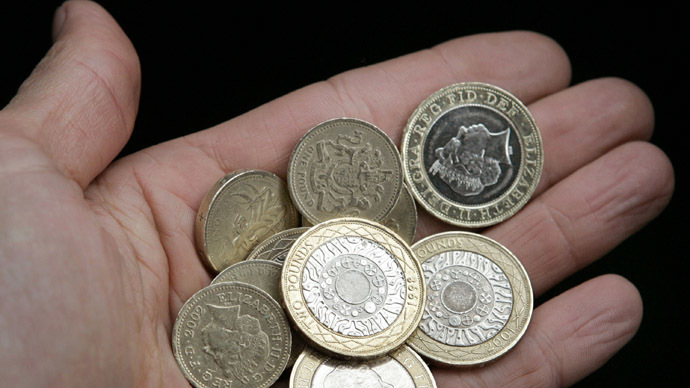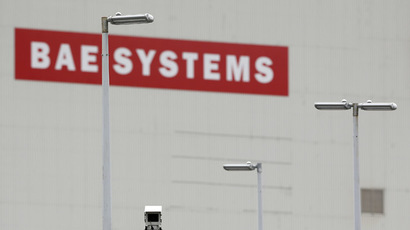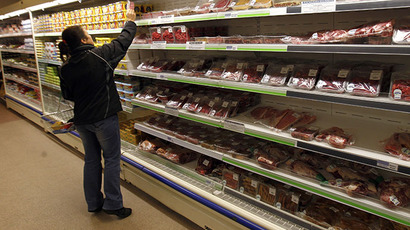UK households 'pushed over edge' as personal debt reaches record £1.4trn

Total personal debt in the UK has reached record highs – 1.4 trillion pounds, a new report has shown. It means that households owe the equivalent of 94 percent of the UK's economic output last year.
An average household debt of 54,000 pounds is now almost twice
the level of a decade ago, the report by the Centre for Social
Justice (CSJ) think tank has found. Indebted households in the
poorest 10 percent of the country have average debts more than
four times their annual income.
According to the report, entitled ‘Maxed Out’, over 130,000
people declare bankruptcy or some other form of insolvency each
year in the UK. More than 8 million households have no savings at
all, affecting about 50 percent of low-income households.
Consumer debt has trebled since 1993, reaching nearly 160 billion
pounds in 2013.
"Years of increased borrowing, rising living costs and
struggling to save has forced many families into a debt trap that
is proving very difficult to escape," director of the CSJ,
Christian Guy, explained, warning that problem debt can have a
"corrosive impact on people and families," affecting their
mental health, relationships and wellbeing.
“Some of the poorest people in Britain are cut off from
mainstream banking and have no choice now but to turn to loan
sharks and high-cost lenders,” he added.
Certain groups are more liable to problem debt than others, such
as the unemployed, single parents, the poorest people who have
little disposable income and spend a large proportion of their
income on basic living costs (in 2013, one-third of unemployed
parents had to borrow to purchase their child’s school uniform),
as well as older people. An estimated 1.1 million people over 50
years old are in problem debt.
Another alarming figure cited in the report shows that over
26,000 UK households have been accepted by councils as homeless
in the last five years because of rent and mortgage arrears, with
over 5,036 becoming homeless last year. Experts fear that this
number is likely to increase should interest rates continue to
rise.
In 2011, almost half of households in the lowest income decile
were spending more than a quarter of their income on debt
repayments.
The CSJ study has come to the conclusion that many people in the
UK are forced to borrow loans because of low financial
resilience. Nearly 4 million British families don't have enough
savings to cover their rent or mortgage for more than a month,
however.
The study, led by former Labour Party politician and Pensions
Minister Chris Pond, said that problem debt carries a major human
cost.
“With falling real incomes and increasing costs of basic
essentials, many – especially the most vulnerable – are sliding
further into problem debt. The costs to those affected, in stress
and mental disorders, relationship breakdown and hardship is
immense. But so too is the cost to the nation, measured in lost
employment and productivity and in an increased burden on public
services.”
Meanwhile, it turns out that a large section of society is
basically excluded from the mainstream financial sector – some
1.4 million people simply have no transactional bank account,
while millions of others do not use their bank account for fear
of penalties and overdraft charges, which are often more costly
than payday loans.
No wonder the number of people seeking free professional debt
advice from charities has been on the rise, reaching 1.7 million
people in 2012. Research shows, however, there is an immense gap
between the above mention figure and the actual 5.3 million
households struggling to meet their credit commitments.
With the rising costs of domestic energy and other major
household bills, more households might be pushed into problem
debt, the study warns. In 2012 an estimated 1.85 million
households were three months in arrears on at least one household
bill or payment.
"The 25 percent increase in the cost of living over the past five
years combined with job insecurity and low savings mean that many
households have been pushed over the edge," the study says.
"Those on a low income are not victims of a housing bubble or
an international banking crash, but of a financial system that is
rigged against them."
Meanwhile, payday lenders, pawnbrokers and home-collected credit
providers lent out 4.8 billion pounds in high-cost credit in
2012, rising sharply from an estimated 2.9 billion pounds in
2009.
CSJ research emphasizes that young people are the biggest users
of payday loans, with one in 10 having taken out a payday loan in
the past four years. In particular, the authors of the study have
heard from support workers for homeless young people that payday
lending is becoming a real problem for this vulnerable group.
"For the most financially excluded, there is often no option
but to turn to illegal moneylenders. It is estimated that over
310,000 people borrow money from these criminals each year.
Seventy-seven Illegal moneylenders extort money from their
victims, often arbitrarily raising interest rates, demanding
payments or charging penalties. Their use of violence and
intimidation terrorizes people and communities, enforcing a ‘veil
of silence’ that allows them to escape detection. This is an
inexcusable crime in modern Britain," the report concludes.














